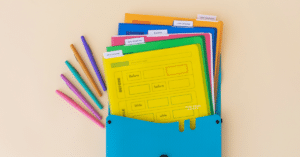Listen on Apple Podcasts Listen on Spotify
This Week’s Episode: How + Why I Collect Probe Data:
This month we are going to discuss all things data. 🤓
We are going to start out this series with the importance of probe data, when to take it, and its importance. I’m excited to share my strategies and routine with you. Creating a framework for my therapy sessions really helped me as an SLP stay organized and focused. And it really helps the student with expectations and accountability.
Every session I start out with probe data.
Strategies + Tips Discussed:
✓Take probe data first thing!
This routine helps set up you and your student for success.
✓Collect data on one goal (per student).
Rotate the goals every session so you
Why is this so important?
Like I mentioned before, it helps set up for success in the session by providing expectations, student accountability AND it helps you as an SLP gauge where the student is at with that goal.
Examples of where to being after Probe Data has been taken:
0% accuracy – step back and teach (reduce frustration)
20-60% accuracy – emerging skill
80%+ accuracy – opportunity to practice in context (reduce boredom)
Additional Resources Mentioned
3 tips for Easy Data Collection Blog Post
Join our Free 5-day Digital Data Bootcamp
Subscribe & Review in iTunes
Are you subscribed to the podcast? If you’re not, subscribe today to get the latest episodes sent directly to you! Click here to make your listening experience auto-magic and as easy as possible.
Bonus points if you leave us a review over on iTunes → Those reviews help other SLPs find the podcast, and I love reading your feedback! Just click here to review, select “Ratings and Reviews,” “Write a Review,” and let me know what your favorite part of the podcast is.
Thanks so much!
Transcript
Marisha Mets: Hello there and welcome to the SLPNow podcast, where we share practical therapy tips and ideas for busy speech language pathologists. Grab your favorite beverage and sit back as we dive into this week's episode.
Marisha Mets: Hey there, it's Marisha and welcome to the SLPNow podcast. This month, we are diving into all things data collection. So we'll start off by talking about collecting probe data and why we would even want to do that. And then we'll talk about organizing the probes strategies to collect data in groups and then how to document therapy data. So without further ado, let's get started with this week's topic.
Marisha Mets: Let's chat about how to collect probe data and why we would even want to do that. If you want to check out any of the resources that I mentioned throughout the podcast, you can find the show notes at slpnow.com/110, and that's slpnow.com/110 and that'll be a great place to keep track of all the different resources. But anyway, when it comes to probe data, I think this is an incredibly powerful strategy because we need that data to drive our therapy. We are making decisions using external evidence, but also internal evidence and what we're seeing in the therapy room.
Marisha Mets: And probe data is just a really nice way to collect that. So I like to collect that data first thing when students come in. So of course, we'll check in and see how they're doing, make sure they're ready to learn and all of that. But once we're checked in and good to go, they know that the first thing we're going to do is a quick probe. It just takes a couple minutes and we run through one goal per student. So it'll be like five to 10 stimulus items, but the main strategies here, do it first thing, collect data on one goal per student. And in terms of why I do it this way, it's a pretty simple process.
Marisha Mets: It also sets me and the student up for success in the session. So let's say that I'm working with a student and they achieve 0% accuracy on the probe. That is a sign to me that I need to step back and definitely not dive into practice. I need to spend some quality time teaching the skill. And this is important because then I know exactly where they're at, how they're coming into the session, how they're doing independently because my goal is for them to use these skills independently in the future. So that doing it right at the beginning of the session helps me see exactly where they're at without any support, without any extra reminders, other than being in the speech room.
Marisha Mets: It's not perfect, but it's the best we can do. So for the student who achieves that 0% accuracy, if I step back and teach, then I know exactly where they're coming in. And it also reduces their frustration. If I were to just jump into a literacy based therapy unit and have them try to use the skill in context, they would be so frustrated. And when students are frustrated, they shut down. They might like exhibit behavior and it's just not a great place to be in. And we're also not in like their proximal zone of development and we're not meeting them where they're at.
Marisha Mets: We're just kind of trying to drag them along to where we want them to be. But by taking that data, seeing it, evaluating it and making it a plan, we can reduce that frustration and set them up for success. And then these are just kind of rough figures. You can use your clinical judgment in terms of which percentage you use. But if a student achieves like 20 to 60% accuracy, I would look at that as an emerging skill. So that can be something that we celebrate like, yay, they were at 0% accuracy for the last three weeks. We did some great teaching and now they're at 40.
Marisha Mets: That's awesome. So, that means that's emerging. And we can use, again, our clinical judgment to decide how much time do we spend teaching, like how much do we want to refresh, how quickly are we going to jump into embedded practice, like what does that look like. But in that zone, I might do like a little bit of teaching, do a quick refresher, maybe do like a structured drill, or maybe if they're at the higher end or if the quick teaching review goes really well, maybe we can just jump into embedded practice. So, that's kind of like that middle zone where we use more of our clinical judgment.
Marisha Mets: But then if a student is at 80 or 100% accuracy, then we definitely want to give them the opportunity to practice in context and really step things up. If we're just sticking to a rigid routine where every time we teach the skill, if a student is at 80 or 100% accuracy, they're going to get bored because they know this skill. They have seen it probably a million times already. And so by focusing too much on the teaching, we're to lose that student and then they also may start exhibiting different behaviors and all of that.
Marisha Mets: So at this end, if they're scoring that higher accuracy, I again want to provide them an opportunity to practice in context, that'll keep them engaged. It's in their zone of proximal development. They're ready for that. So, that's what we've got in terms of very quick explanation of how I structure my probe data collection and why. Join us next week for more of the nitty gritty on how to actually organize that process, how to gather your probes, how to know which goals you're going to collect data on and how to organize it so that it's like a nice seamless process.
Marisha Mets: So, that's a wrap for today and we'll see you next time. And then again, if you want to check out this show notes with a quick recap, I also have like a little blog post on data collection. You can find that at slpnow.com/110. We'll see you next week.
Marisha Mets: Thanks for listening to the SLPNow podcast. If you enjoyed this episode, please share with your SLP friends and don't forget to subscribe to the podcast to get the latest episode sent directly to you. See you next time.
Sign up to receive email updates
Enter your name and email address below and I'll send you periodic updates about the podcast.




I tried to submit a review, but I couldn’t really see how to do it. The most recent reviews were from 2019 so I’m not sure what’s up with that. Anyway, I LOVE, LOVE, LOVE all of what you are doing! You remind me of myself 20 years ago, but I didn’t have the technology or the organizational skills to ever pull this off or even dream that someone else out there thinks like me. I have been so overwhelmed and am feeling the burnout after 25 years primarily in the school setting. Indiana has among the highest school SLP caseloads in the nation and a badge of shame in my opinion and is facing a crisis in special education staff because of years of abuse, but I digress. To my point: thank you for giving me some hope and a ray of sunshine. The probes are genius and the way you break everything down in such bite sized pieces is exactly what I needed. Just a little bit at a time makes it seem less overwhelming. I’m so glad my principal agreed to let me try this because it has taken me over a year now to slowly use more and more of the system capabilities. I have always tried to create and accumulate probes over the years and usually try to pull them out (if I can find them) at the end of the grading period to take a formal data point for the report card. It has worked ok, but has been extremely cumbersome, as I can’t keep everything organized. The idea of choosing the probes up front and attaching them to the student digitally is exactly what I have needed! Plus I love the way you explained the pre-session probes vs post session data and the %ranges for instruction level! Absolutely genius! Anyway, I’m going to take the academy after I finish the data collection series. I’m a data cruncher at heart and my secret desire is to design and implement research studies! LOL. In my dreams, right? I’m going to have to explore how and where you are putting the probe data, as opposed to the session data, which I haven’t really been using appropriately. Thank you again and if there is any place to give you a five star rating which would help you out, please let me know how to do that. Angela